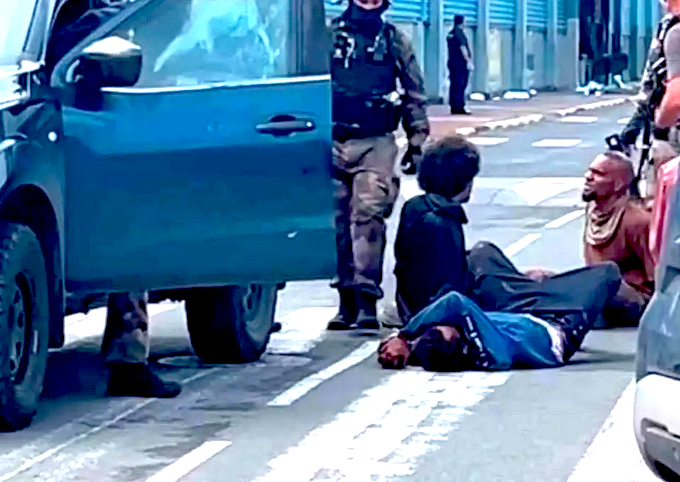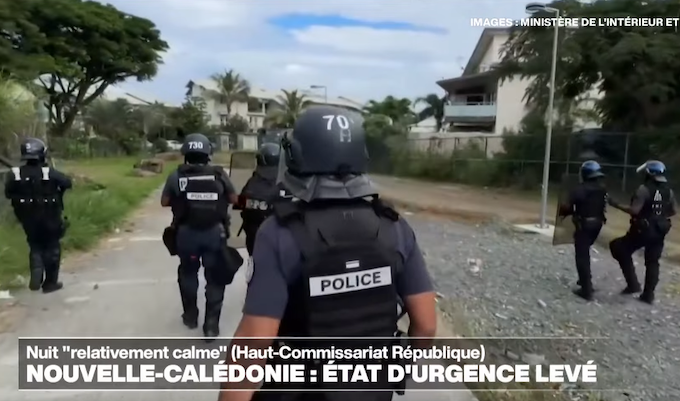
Correction: An earlier version of this RNZ Pacific story published on 29 May 2024 attributed a statement from the French High Commission in New Caledonia to the French Ambassador for the Pacific, Veronique Roger-Lacan. The misattribution has been corrected on 30 May 2024, and the statement is correctly attributed to the French High Commission in New Caledonia.
By Kelvin Anthony, RNZ Pacific digital lead, and Margot Staunton, RNZ journalist
Police brutality will further escalate tensions between pro-independence activists and French security forces in New Caledonia, a senior church leader in Nouméa says.
On Tuesday night, video footage which shows a French security officer, who appears to have apprehended a Kanaky activist, then pushed the handcuffed man to the ground, before kicking him in the head and knocking him out.
The clip — shared on a Nouméa neighbourhood watch Facebook group — is being widely circulated online and has been shared almost 400 times (as on Wednesday 3pm NZT).
- READ MORE: ‘I can’t just stand back’: Kanak pro-independence activist follows mum’s footsteps
- Blood in the Pacific: 30 years on from the Ouvéa Island cave massacre
- Other Kanaky New Caledonia reports
According to sources, the incident occurred at the Six Kilometre district in Nouméa.
They are concerned it is due to actions like this that Paris has banned TikTok in New Caledonia so human rights abuses by the French security are not exposed.
RNZ Pacific has contacted the French High Commissioner’s office and the French Ambassador to the Pacific for comment, seeking their response to this footage.
Reverend Billy Wetewea from the Protestant Church of Kanaky New Caledonia told RNZ Pacific the police action was “not helping to bring calmness to the people on the ground”.
“Like this kind of action from the police is not helping in our people to not go into violence against [sic],” he said.
Reverend Watewea said the Kanak people on the ground had been advised to record all the movements of the security forces.
“Especially when police forces are starting to attack [indigenous pro-independence Kanaks].”
He said the footage that surfaced on Tuesday night was “not the first” such incident.
“Some other situations in videos has been recorded as well. The people in responsibility will take those issues to the court because that’s not acceptable coming from police to have this kind of behaviour.”
The death toll during two weeks of violent and destructive riots in New Caledonia has risen to seven.
In a statement, the French High Commission said 134 police officers had been injured and nearly 500 people had been arrested.
The state of emergency in the territory was lifted on Tuesday.
The statement said that while the state of emergency had been lifted, the ban on gatherings, the sale and transport of guns and alcohol, as well as the curfew, remained in place.

Resistance will continue
A Kanak pro-independence activist Jimmy Naouna predicts police brutality and riots will continue as long as New Caledonia is highly militarised.
A security force of 3000 remains in Nouméa with a further 484 on the way.
The economic cost as a result of the unrest is estimated to be almost 1 billion euros (US$1.8 billion).
Pro-independence alliance FLNKS member Naouna told RNZ Pacific the territory needed a political solution, not a military one.
“They keep sending in more troops but that won’t solve the issue,” he said.
“This is a political issue and it needs a political solution. The more you have the military and the police on the ground, the more violence there will be on both sides,” he said.
‘People want to be heard’
Wetewea told RNZ Pacific while the presence of the French army on the streets has eased tensions, the decisions made at the political level in Paris are not helping to calm the people on the ground.
He said the French President Emmanuel Macron is not listening to the indigenous people’s voices and the indigenous people have “had enough”.
“For the people on the ground, they have had enough,” he said.
“They want change. People want to be heard, people on the ground, people who are suffering in their houses. And we are facing now a situation that will be hard to recover from.”
Naouna said Macron’s visit to the territory was merely a “political manoeuvre”.
He said the pro-independence groups were expecting the French President to abate tensions by suspending and withdrawing the electoral reform bill.
“[Macron] is losing support in his own political groups. In France, coming up in June. He is losing support for the European elections.
“So, it is mainly for his own political gains that he has had to come to New Caledonia.”
Wetewea said there was a realisation in New Caledonia that the events were led by indigenous young people in the city who have been denied opportunities and discriminated against.
“That is the the part of the population that France was not taking care of for a long time, the part of the population that faced discrimination every day in schools, in seeking employment.
He said the young people expressed all of these frustration towards a system that did not acknowledge them.
“But looking more largely against the system that does not really incorporate or acknowledge our the Kanak people and their culture.”
‘Stifling free speech’
Asia Pacific Report editor and Asia Pacific Media Network (APMN) deputy chair Dr David Robie deplored what he called the “the French tactics of reverting back to the brutality of the crackdowns during the 1980s”.
“It’s no wonder the French authorities were quick to ban TikTok, trying unsuccessfully to stifle free debate and hide the brutality,” he said in response to the disturbing footage.
He said there was a need for dialogue and a genuine attempt to hear Kanak aspirations, and public goodwill, in a bid to reach a consensus for the future.
“If there had been more listening than talking by Paris and its ministers over the past three years, this crisis could have been avoided. But repression now will only backfire.
“The 1980s ended in the terrible Ouvéa massacre. Surely some lessons have been learnt from history? Independence is inevitable in the long run.”
This article is republished under a community partnership agreement with RNZ.












































